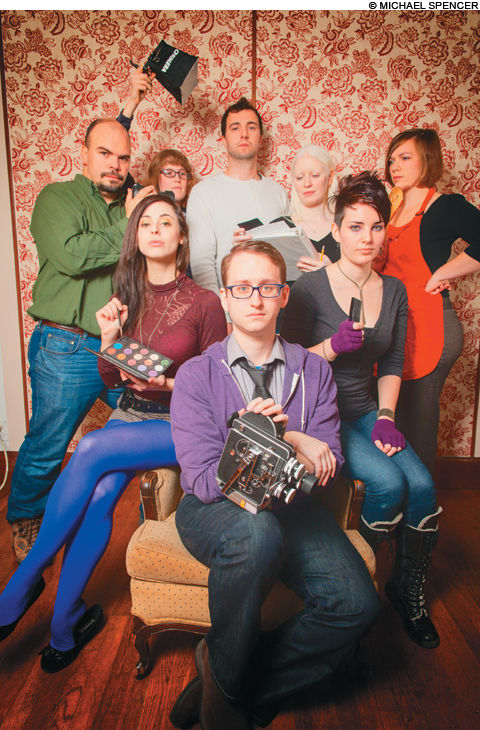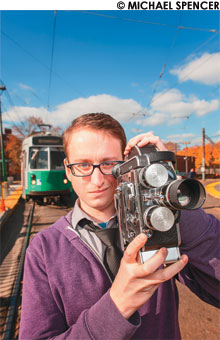
Director Jared Vincenti and the crew from “Turner Street Productions" |
It's May, and about a mile north of the Boston College stop on the B line, in a three-decker on Turner Street in Brighton, a scene from director Jared Vincenti's film Day of Youth is about to be shot. The film is a mumblecore, high-concept romantic comedy in which Rhee, a twentysomething college-grad barista, falls into a coma after a bike accident and wakes up three years later to find that absolutely nothing in her life has changed: it remains directionless, unfulfilling, afflicted by the same messy relationships.
It's hard to tell that there's a movie production in progress. The scene, a party in the backyard, looks like any party in any backyard, except for the lights, reflectors, audio-recording equipment, and camera. The production office is the living room on the third floor — where Vincenti, 30, waits for dusk to start shooting. The setup doesn't look like much compared to the studio-film rows of equipment trucks and trailers that have become a common sight in the city.
 |
For those street-blocking, celebrity-studded productions, you can thank the Massachusetts Film Office. Since 2005, it has offered a tax incentive for movies with budgets of more than $50,000. That deal has attracted such big projects as Ben Affleck's The Town and Seth MacFarlane's Ted. And they've made use of Boston locations, talent, and resources, stimulating the economy and providing employment in the film business. According to MFO director Lisa Strout, the program attracted six Hollywood productions in 2012 and five in 2011, compared to one in 2004, a year before it came into effect. These projects generated $222 million in local direct spending in 2011 alone. Because of the success of the program, she adds, more than 500 local companies have benefitted by serving film productions in some capacity, and more than 40 companies have been established that work for the film industry exclusively.But what about the little guys, the scrappy independents who want to make their breakout movie on a shoestring? In January, MovieMaker magazine listed Boston as the sixth-best city in the country for independent filmmakers. It based its assessment largely on the appeal of the tax incentives. But what does the film office do for the smaller films, the vast majority of local projects, whose budgets are not big enough to qualify?
For a movie like Day of Youth, which costs a lot less than $50,000 to make, there's no tax deal. But Vincenti sees important indirect benefits.
"I'll end up with a budget of $10,000," he says. "But I've gotten the equivalent of about a $100,000 to $150,000 budget, if you just take the rentals I would have to pay for gear, and the cost of the cast and crew. They all work for free."
That's where the benefits of the Film Office kick in, indirectly.
"The studio movies attract talent, and you get a lot of people who are here who have the skills and are hungry for more," he says. "So you have a lot of talent here, but they're not getting above the line in the big pictures. That's why everyone here isn't doing it to make money, but to get it out there, to get recognition, to get it seen — so that we can take that step up to the next tier."
This creates communal spirit among Boston indie filmmakers. They collaborate on ideas and work for free on each other's projects. That's especially true with Day of Youth. It's an in-house production — literally. Almost everyone in the film lives in the house where it's being shot.